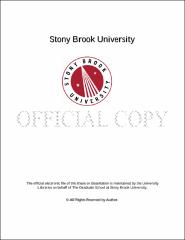| dc.identifier.uri | http://hdl.handle.net/11401/76887 | |
| dc.description.sponsorship | This work is sponsored by the Stony Brook University Graduate School in compliance with the requirements for completion of degree. | en_US |
| dc.format | Monograph | |
| dc.format.medium | Electronic Resource | en_US |
| dc.language.iso | en_US | |
| dc.publisher | The Graduate School, Stony Brook University: Stony Brook, NY. | |
| dc.type | Thesis | |
| dcterms.abstract | Abstract of the Thesis DNA Damage induces invasion of MCF-7 (Human Breast Adenocarcinoma) Cells by Ronald S. Chavez Master of Science in Biochemistry and Cell Biology Stony Brook University 2016 Breast Cancer is a common malignancy in American and European women, and approximately one-third of these women develop metastasis and die from the disease. Chemotherapy is widely used to treat breast cancer and is known to extend survival of patients. Despite this fact, a small percentage of cells can endure and gain resistance to these treatments. Clinicians have sought to increase the time and intensity of these doses to reduce resistance whereas others have lowered the doses to reduce toxicity. The chemotherapeutic agent Doxorubicin is used as an adjuvant treatment for tumors of the lung and breast. Its anti-tumor activity is thought to occur through DNA breaks in the tumor cell. Our findings indicate that low dose doxorubicin induces SRC and Fyn tyrosine kinases and the invasiveness of MCF-7(Human breast Adenocarcinoma, ER+ luminal) cells. Using the MCF-7 cell line, we explored the effects of various Doxorubicin doses on the expression of SRC and Fyn pro-invasive genes identified from our RNA sequencing data. Our results suggest that the in vitro sub-lethal Doxorubicin dose falls in the concentration range of 400 nM to 600 nM, and it is mainly inducing Fyn at the transcriptional level. Our subsequent experiments focused on Fyn mRNA up-regulation in breast cancer cells, since previous studies have shown Fyn to play a role in progression and metastasis in malignancies such as prostate cancer. Interestingly, knockdown of p53 via siRNA, suppressed this induction, indicative that Fyn upregulation is occurring as a response to DNA damage. To further complete our study, we determined if SRC and Fyn up-regulation is a universal mechanism associated with other DNA Damaging agents and chemotherapeutics. Our results indicate that MCF-7 cells treated with UV light, etoposide, Camptothecin and Taxol do not show a significant upregulation of SRC and Fyn genes, thereby confirming that induction of these tyrosine kinases is Doxorubicin specific. Lastly, we determined Doxorubicin is not inducing Fyn mRNA through an Epithelial-Mesenchymal transition but rather as a Doxorubicin specific DNA damage response. | |
| dcterms.available | 2017-09-20T16:51:23Z | |
| dcterms.contributor | Hannun, Yusuf A | en_US |
| dcterms.contributor | Luberto, Chiara. | en_US |
| dcterms.creator | Chavez, Ronald Steven | |
| dcterms.dateAccepted | 2017-09-20T16:51:23Z | |
| dcterms.dateSubmitted | 2017-09-20T16:51:23Z | |
| dcterms.description | Department of Biochemistry and Cell Biology | en_US |
| dcterms.extent | 36 pg. | en_US |
| dcterms.format | Monograph | |
| dcterms.format | Application/PDF | en_US |
| dcterms.identifier | http://hdl.handle.net/11401/76887 | |
| dcterms.issued | 2016-12-01 | |
| dcterms.language | en_US | |
| dcterms.provenance | Made available in DSpace on 2017-09-20T16:51:23Z (GMT). No. of bitstreams: 1
Chavez_grad.sunysb_0771M_13008.pdf: 2886501 bytes, checksum: a4ce8dc66c482c3d4c45115676d8f9d9 (MD5)
Previous issue date: 1 | en |
| dcterms.publisher | The Graduate School, Stony Brook University: Stony Brook, NY. | |
| dcterms.subject | Biochemistry -- Molecular biology | |
| dcterms.subject | Breast, Cancer, Fyn, SRC | |
| dcterms.title | DNA Damage induces Invasion of MCF-7(Human Breast Adenocarcinoma) Cells | |
| dcterms.type | Thesis | |

